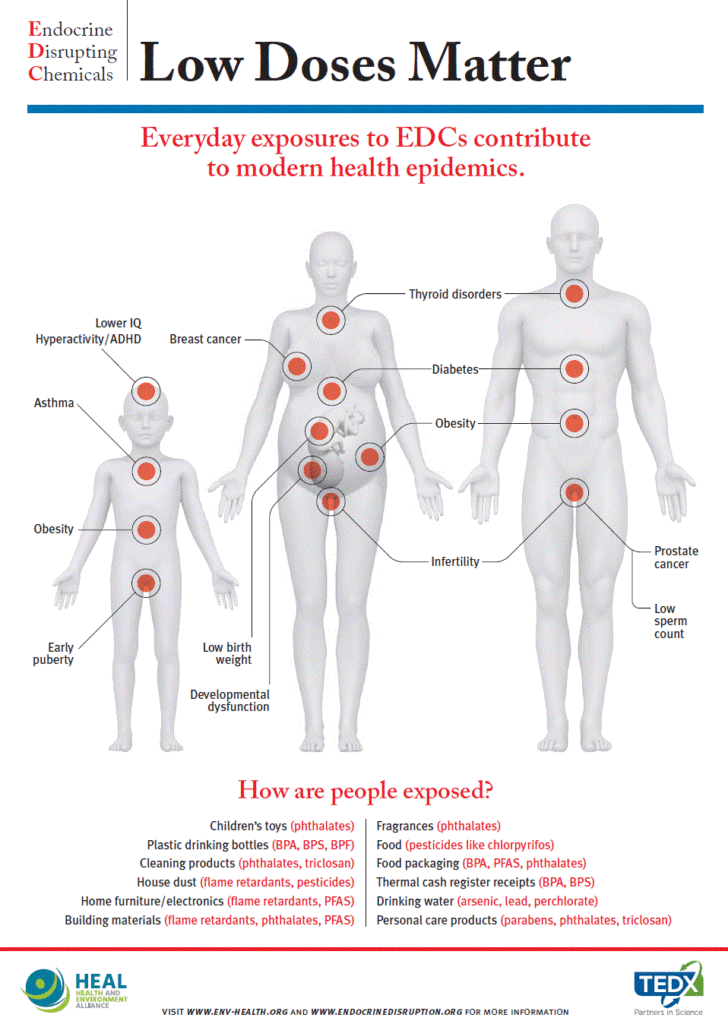
HEEDS is interested in developing educational materials that can be used in teaching undergraduates and graduate courses related to EDCs. Our goal is to make it easier to develop lectures and courses.
If you are interested in contributing to the HEEDS educational materials section, contact HEEDS. Anything submitted must be certified to free of copyright infringements or confidential material, and you must give permission for anyone to download and use the material.
Resources for Clinicians
Let’s Talk EDCs: Resources for Clinicians and Patients from the Endocrine Society.
The Program on Reproductive Health and the Environment at UCSF provides numerous resources for clinicians on environmental health, including EDCs.
Pediatric Environmental Health Specialty Units (PEHSU) National Classroom has a large selection of for-credit, free, on-demand webinars on a variety of environmental health topics, including many on EDCs.
CME course: Nonstick Nuisance: Medical Monitoring for PFAS
Available via Michigan State University.
California Nurses for Environmental Health and Justice provide CME courses on a variety of environmental topics.
Articles
Prescriptions (Rx) for Prevention: Clinical Tools for Integrating Environmental Health into Pediatric Clinical Care describes tools and factsheets for clinicians and patients.
Bland et al. Journal of Public Health Management & Practice 31(2):p 244-251, March/April 2025.
Disparities in Environmental Exposures to Endocrine-Disrupting Chemicals and Diabetes Risk in Vulnerable Populations includes a Healthcare Provider Guide on EDCs for clinicians.
Ruiz D, Becerra M, Jagai JS et al. Diabetes Care. 2018 Jan;41(1):193-205.
There Are Good Clinical, Scientific, and Social Reasons to Strengthen Links Between Biomedical and Environmental Research
Porta M and Vandenberg LN.
J Clin Epidemiol. 2019 Mar 21.
New Approaches to Cope with Possible Harms of Low-Dose Environmental Chemicals
Lee DH and Jacobs DR.
J Epidemiol Community Health. 2019 Mar;73(3):193-197.
Interventions to Address Environmental Metabolism-Disrupting Chemicals: Changing the Narrative to Empower Action to Restore Metabolic Health
Sargis RM, Heindel JJ, Padmanabhan V.
Front Endocrinol (Lausanne). 2019 Feb 4;10:33.
Evidence of the Possible Harm of Endocrine-Disrupting Chemicals in Humans: Ongoing Debates and Key Issues
Lee DH
Endocrinol Metab (Seoul). 2018 Mar;33(1):44-52.
The Role of Nutrition in Influencing Mechanisms Involved in Environmentally Mediated Diseases
Hennig B, Petriello MC, Gamble MV et al.
Rev Environ Health. 2018 Mar 28;33(1):87-97.
Developing a Clinical Approach to Air Pollution and Cardiovascular Health
Hadley MB, Baumgartner J, Vedanthan R.
Circulation. 2018 Feb 13;137(7):725-742.
Slides
Dr. David Collier, East Carolina University, has submitted slides, Environmental Chemicals and their Impact on Child Health: A Focus on Endocrine Disrupting Chemicals, and a Teaching Session on EDCs for medical doctors, with answer key.
Dr. Jodi Flaws, Univ. of Illinois, has provided slides from her course, “Reproductive and Developmental Toxicology,” on Endocrine Disruptors and the Reproductive System.
Educational Resources
SHARP Training: Skills for Health And Research Professionals
The SHARP (Skills for Health And Research Professionals) Training Program at Columbia University offers short, intensive boot camps and workshops led by experts to teach in-demand skills on various topics in research and education. Programs are offered in New York City and in Portland, Oregon. Many topics relate to EDCs.
The Program on Reproductive Health and the Environment (PRHE) at UCSF provides a variety of educational materials on EDCs for the general public.
HEEDS has produced factsheets on EDCs.
Endocrine disruption infographics and fact sheets are available from HEAL and The Endocrine Disruption Exchange. For example, here is the infographic, Low Doses Matter:

